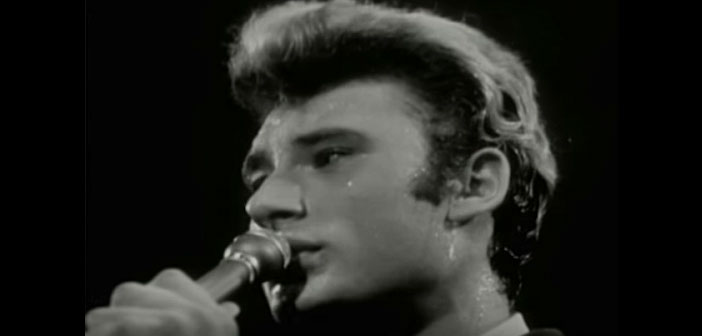In 1963, Ian Birchall reflected on two traditions of French popular music but thought a synthesis between them unlikely.
This article will not attempt to survey the whole of French popular music, which is a highly complex field, but to pick out one or two features which are interesting in comparison with England and the US.The Anglo-American influence on French popular music, with the influx of rock and twist, has been Very marked. Elvis, Cliff Richard, Helen Shapiro, are highly popular in France; and the work of Johnny Halliday and Richard Anthony is not significantly different from that of their foreign models—often, indeed, they sing in English. The values they embody are the same as those of American artists; they offer identification to their listeners, singing of familiar experiences, as when Halliday sings ‘Samedi Soir” or “Retiens la Nuit’. The heavy rock beat that accompanies them expresses individualism and rebellion.
But this is not the only tradition of popular music in France. The French have for a long time been more politically aware than the English, because of the greater political instability in their history. The Algerian war continued this process; a bomb on the doorstep is the greatest spur to political consciousness that I know of. Against this background grew up, the work of singers like Georges Brassens and Leo Ferré-a more literary and intellectualised form of song, with many social and political allusions, but nonetheless with a very wide popularity. To those readers not familiar with their work I can do no more than quote one stanza from a song by Ferré:
Pour l’anarchiste à qui tu donnes,
Les deux couleurs de son pays;
Le rouge pour naître à Barcelone,
Le noir pour mourir à Paris,
Thank-you Satan.
There is nothing comparable to this sort of song in English. There is now a vigorous tradition of spontaneous political song in England, as any Aldermarcher will testify, but nothing akin to the poetic, satirical melancholy of Brasse and Ferré. One needs only to compare Ferré’s “Miss Gue-guerre’ to the few mawkish CND songs that have been recorded in England.
These two forms of popular music appeal to different audiences; Halliday and Anthony have their fans among the teenagers, disillusioned without ever having had illusions. Ferré and Brassens find their audience among a somewhat older age-group, with greater experience and maturity. But there are common factors.
In the first place, a rebellious irreverence; last August, Johnny Halliday provoked many protests by singing the ‘Marseillaise’ (with all its associations with the glorious dead of the past and the inglorious living of the present régime) to a twist rhythm—we are reminded of Brassens’ hero who has a ‘Mauvaise Réputation’, because he does not accept the values of the ‘bons bourgeois’.
Secondly, there is a certain nihilism, though in differing forms, in both traditions; Halliday and Anthony express the anarchistic individualism of early rock; Ferré, in a song like ‘Merde à Vauban”, expresses the harshness and bitterness of the defeated.
This cynicism is typical of a country that has lost faith in politics; a breakthrough could come with a synthesis of the youthful vigour of Halliday and Anthony, and the more mature social consciousness of Bassens and Ferré. Such a synthesis in the musical field does not seem likely without a significant change in the whole social and cultural complex. It is for this that we must hope.
Ian Birchall, ISIS 20 November 1963. Ian wrote this article when he was 24 for Oxford University student magazine Isis, which was founded in 1892, long before the name was used by the extreme Jihadist group of recent years.

